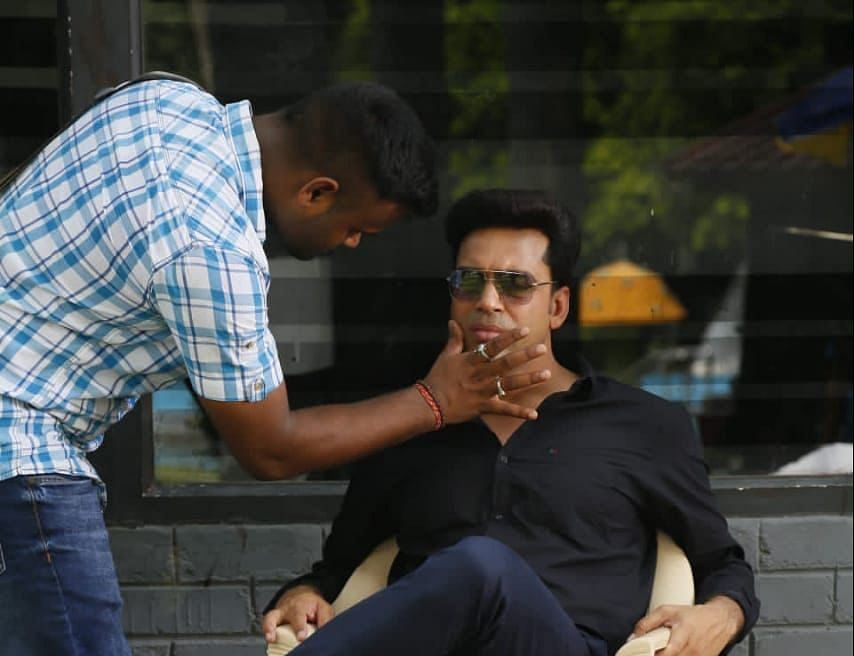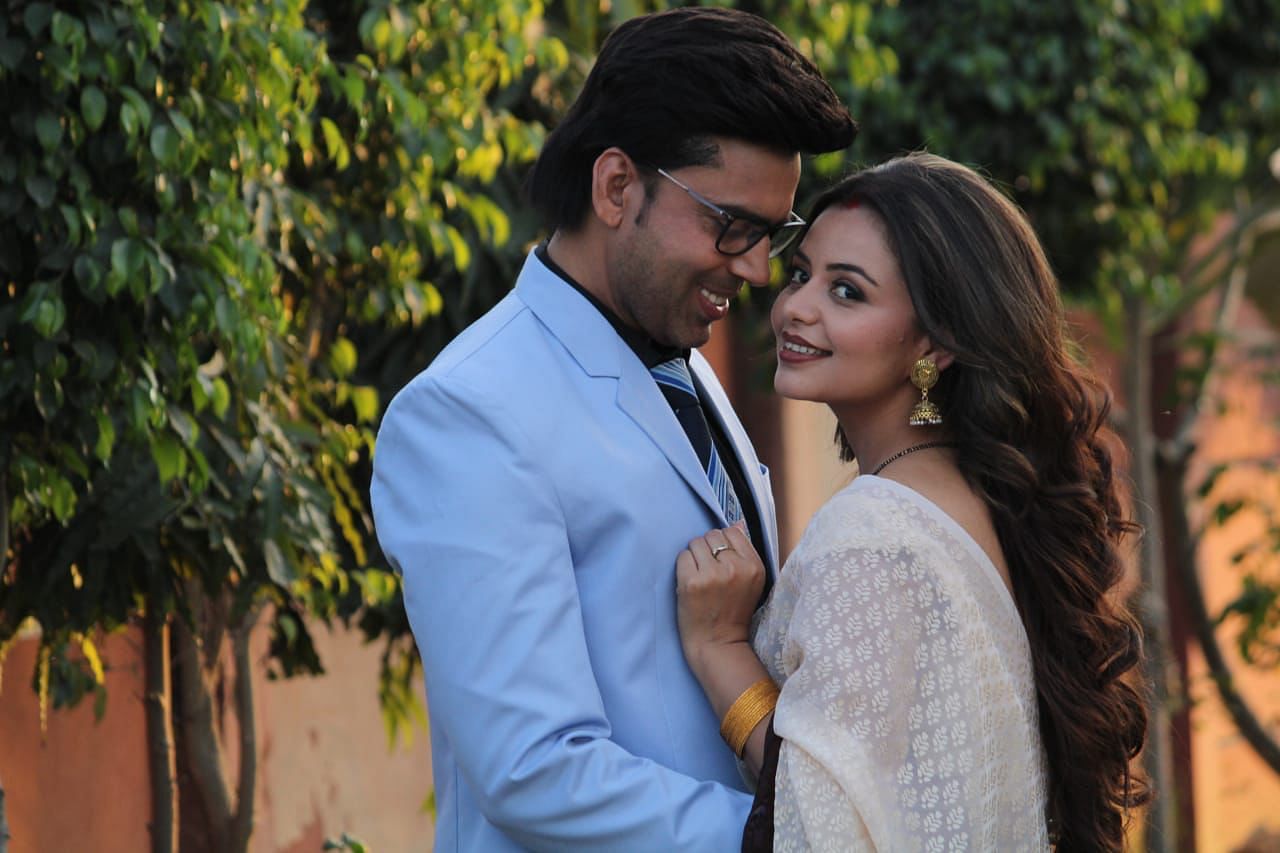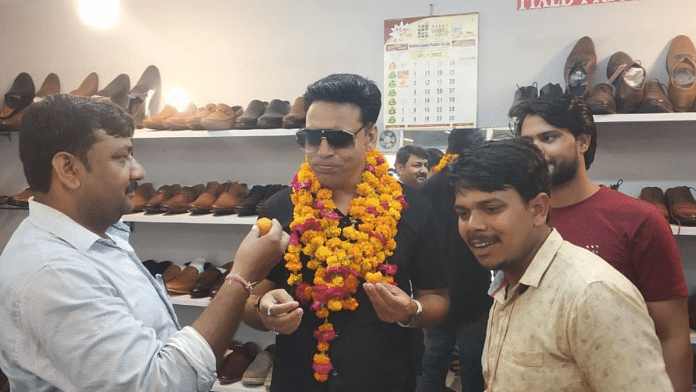Agra: It’s a rainy day in the city of the Taj Mahal, and Anand Kumar Ojha’s phone is ringing continuously. He must ease a traffic jam at a busy market and meet the Superintendent of Police to discuss pending matters. In his perfectly ironed khaki uniform and spotless brown leather shoes, Ojha, a traffic police inspector in Agra, Uttar Pradesh, is ready for the call of duty. But there are other calls he does not miss — calls from his movie directors.
Nurturing his childhood dream of appearing on the big screen, Ojha squeezes the annual leaves from his police job to act in Bhojpuri films. Having churned out three lead-character films in a decade and with three more scheduled for release this year, Ojha’s horizons are expanding. Directors known to him through his Bhojpuri films have offered him roles in Hindi and Telugu cinema as well.

“Cinema is Anand’s first love,” says director Dhiraj Kumar who offered Ojha his first break in a Bhojpuri movie called Sabse Bada Mujrim (2013) where he played the lead actor Rahul Roy’s younger brother. Calm and composed under stressful situations at his job as a traffic cop, in the film, Ojha plays an angry young man who kills his own father to avenge his mother’s rape. In Kumbh Niwas (2022), he falls in love with a ghost, sings and dances with her in flashy attire and single-handedly beats up the land mafias who want to break the house down where the ghost lives. In Rann (2022), he is an Army man who takes revenge on his lover’s murderers. Ojha’s colleagues also agree that his on-screen anger and hatred are in stark contrast to his charming personality.
He is now all set to make a debut with big stars in cinemas beyond Bhojpuri.
“I will launch him in my next big film. I am also in talks with a big OTT platform for a Hindi web series, and Ojha will be a part of that as well. He will be seen in a positive role that fits him,” says Kumar. The film will be announced this month and the web series a month later.
Ojha has also caught the eye of casting director and celebrity manager Mithilesh Tiwari who is taking him to Tollywood. “Things are in the pipeline with a reputed production house that has already produced 15 to 20 movies. Top 20 Telugu actors have worked under that banner. But I cannot disclose anything more at this point,” says Tiwari.
Posted in Agra in 2019, Ojha seamlessly switches between being a tough cop and an actor grooving to peppy songs, romancing his co-stars, and fighting the villains.

His latest film Rann, with well-crafted action scenes, special effects, and specialised make-up to suit each character, is on track to reshape the perception of Bhojpuri cinema, Ojha says. Rann‘s success has ensured Ojha too gets the audience’s attention.
But Ojha, 45, with his intense brown eyes and athletic physique, is taking it slow. Although his calendar is full now, his success hasn’t come easy. Besides, his job as a cop allows him only two months in a year to shoot, and that’s when he prioritises acting in Bhojpuri films.
“When I had nothing working for me, this job came as a saviour. I cannot leave it now. And with Bhojpuri films, I have a special attachment. If I have committed, I will not take my word back,” says Ojha, remembering his days of struggle in his dilapidated government bungalow in Agra.
With Ojha having signed four to five big Bhojpuri films this year, Bollywood and Tollywood will have to wait till next year to see the actor marking his charm.
Also read: ‘Ab hathiyaar uthao’: A Dadri singer is firing up youth with Rajput-Hindutva DJ tracks
The struggle
Born in a farmer’s family in the Doghera village in Arrah, Bihar, Ojha and his friends would save 25 and 50 paise as pocket money on a usual day. A rupee was their ticket into the world of undiluted action, drama, and romance where a VCR in a small room would show them Amitabh Bachchan, Dharmendra, Rajinikanth, Mithun Chakraborty, Rishi Kapoor, and Rajesh Khanna sacrificing their lives for their families, fighting injustice and shaking a leg with their romantic interests.
This image of a ‘hero’ was entrenched in Ojha’s mind when he was just 10.
“I always wanted people to like me in a positive way, and I felt being a hero was the only way to achieve it. It felt like the right profession,” says Ojha.
He fled to Mumbai twice. The first time was with a friend when he was in middle school and they had just seven rupees in their pockets. The second time, Ojha dropped out of class XI, and in full filmy style, wrote a letter to his parents that he will return only after achieving something.
Ojha knew that his father, Bhagwan, who stressed on completing an education, would never agree to send him to Mumbai.
“I had read in Mayapuri magazine (a Bollywood magazine those days) that Rajnikanth was a bus conductor yet a superstar. So, I was convinced that education is not necessary to be an actor,” says Ojha.
But success did not come easy to Ojha. In Mumbai, he took a night job as a security guard for Rs 800 a month outside an under-construction building. During the day, he would visit studios. In four months, with no headway in pursuing his dream, he was drained and frustrated. He returned to his village to his father, completed school and applied for the UP police vacancy.
In Agra now, when, at the opening of Rann at Hira Talkies, fans buzz around him for a selfie and cover his neck in marigold garlands, Ojha, in his black shirt and dark sunglasses, cannot stop beaming.
“I feel if you really want something, things work out for you,” he says.
Along with the luck, his batchmates from police training days feel that Ojha’s persistent dedication has got him this far.
“At the police training academy, while all of us used to vile away our time after the classes, Ojha would attend dance classes,” says Ashutosh Kumar Singh, deputy inspector of traffic police posted in Agra.
Part of then-Chief Minister Mulayam Singh Yadav’s security cordon, Ojha, called ‘hero saab’ by his colleagues, used to hit the gym at 6 am and report to duty two hours later. In the evening, after getting free, he would again go for martial arts and dance practice.
Ojha got a chance to visit Mumbai again with the CM. That was when he met Bhojpuri film director Nirmal Pandey who instantly offered him a role. But as luck would have it, the movie ran into a financial dispute and was never made. So was the fate of his second film with actor Ravi Kishan. Ojha spent 10 days in a hotel room and was dropped from the film, which left him completely broken.
While he couldn’t make it to the big screen then, he left a big impression on the people. Now it is apparent in the current offers from Bollywood and Tollywood.
Also read: Big hits, bigger numbers—South Indian films have charmed Hindi viewers, and for good reason
Childhood dreams
Despite setbacks, Ojha’s resolve to be a hero never diminished. Growing up, village weddings were his chance to flaunt his dance moves, and without telling his parents, he enrolled in trial music lessons. As a child, he would read the Mayapur magazine, which his uncle used to bring from the city, and would spend hours reading about Bollywood stars’ lives.
“I found out through the magazines that all heroes live in Bombay. I did not know where Bombay was or how to reach there, but I knew I had to be there,” says Ojha.
He shared his dream of becoming a movie star with 10 to 12 of his friends. For sending him to Mumbai, everyone generously decided to chip in.
“There was hardly any pocket money those days. So, we stole mangoes from our farms and sold them in the markets to collect money for him,” says Ashok, his childhood friend who ran away with him to Mumbai the first time. The duo, however, returned midway when they were famished.
With 600 rupees and a bunch of photos shot outside the only touristy-looking location in the village, the temple, they sent him off to the city of dreams.
“He would hum songs all the time. We would go to the fields and Anand would imitate singer Kumar Sanu. At a time when there were no mobile phones or internet, he would entertain us,” says Ashok.
Ojha would hang around at the Bharatiya Natya Parishad, a theatre group now shut, where teams from across India came to perform. He would watch their plays, serve them tea, set up the stages, and do other backend work. But his dream to be a hero was still alive.
Also read: ‘Why is your dad wearing a sari?’ South Indian films handle queer with care, unlike Bollywood
Scaling new heights
Ojha pulls out his phone to show the poster for his upcoming Bhojpuri film Maahi – his biggest till now, which will also be dubbed in Hindi. With a silhouette of an Avatar-like figure standing tall against the light, it looks anything like a Bhojpuri film poster with an element of suspense and superhero action.
Cinema halls in Agra are waiting to get the screening rights for Rann as soon as it is pulled down from Hira Talkies. The filmmakers are in talks with Amazon Prime and the producers of Maahi are talking to Netflix.
“Maahi has more action,” says Ojha. The mask he is seen wearing in the poster was made in London, he adds.
But Ojha’s lifestyle is no different than that of his peers in the police. He is a serving policeman and cannot earn income from more than one source. His share of the film’s budget, he explains, goes into its production, pushing the quality higher than that of low-budget films.
“I am trying to produce quality cinema so that I can take Bhojpuri cinema to the global level,” he says.
His friends and admirers agree.
“Bhojpuri industry does not have many actors with formal training. But that is changing now, and Ojha is one such actor who is carving that path of change. Action was also missing in Bhojpuri films. But Ojha’s films have a big element of that,” says A. K. Shahi, SHO, Sikandra, Agra, who was also his batchmate.

Sources in the police say that Ojha will soon be promoted as Deputy Superintendent of Police.
And in the film department, once he makes a mark, he will enter politics, Shah laughs. “All Bhojpuri actors have had this career trajectory,” he says.
(Edited by Humra Laeeq)



